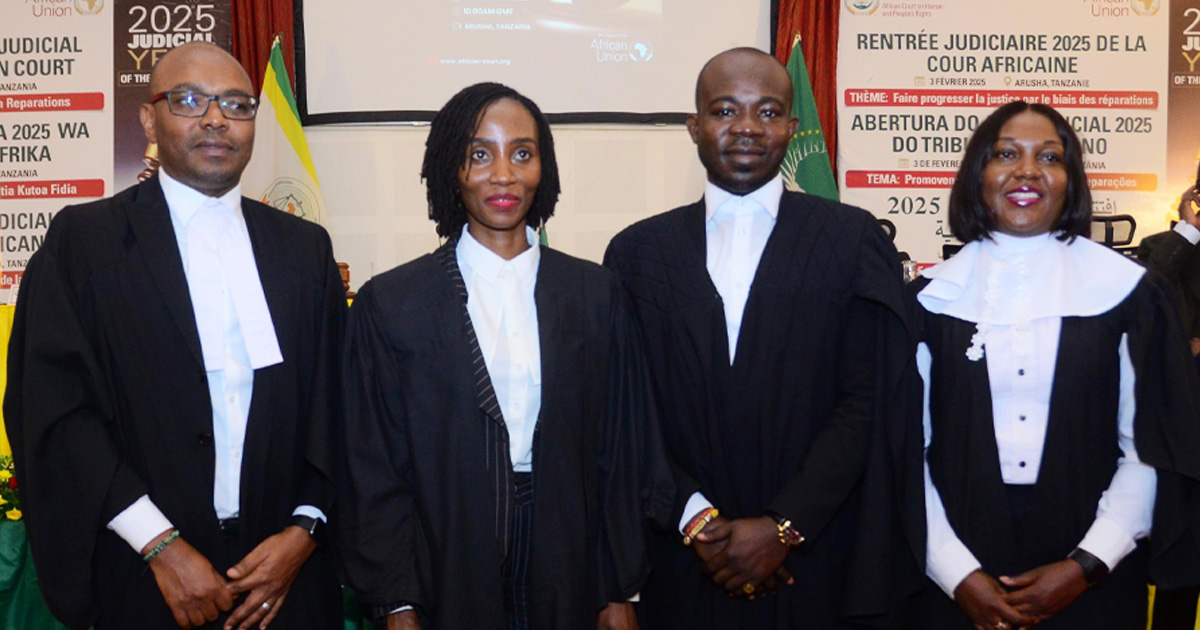The Centre for Human Rights, Faculty of Law, University of Pretoria is pleased to announce a groundbreaking judgment issued by the African Court on Human and Peoples’ Rights today (5 February 2025), in Application No. 019 of 2018 Centre for Human Rights (CHR), Institute for Human Rights and Development in Africa (IHRDA) and Legal and Human Rights Centre (LHRC) v. United Republic of Tanzania.
This application was filed as part of the Centre’s response to the plight of persons with albinism in the United Republic of Tanzania, and in particular challenged the State’s failure to protect persons with albinism from widespread discrimination, persecution and humiliation that have occurred since time immemorial. The application was based on evidence and reports revealing that persons with albinism in Tanzania suffered difficulties in accessing essential social services, were subjected to sexual violence, abductions, body mutilation and killings, all rooted in harmful cultural beliefs and practices. These harmful cultural beliefs and practices include the characterisation of children with albinism as a curse, the mythical belief that sleeping with women with albinism would magically cure HIV and AIDS, and believing that using the body parts of persons with albinism would bring wealth, luck and success in business and politics.
Findings and orders
In its judgment, read by Justice Stella Anukam, the African Court found Tanzania in violation of its obligation to give effect to the rights of persons with albinism guaranteed under the African Charter on Human and Peoples Rights, including the right to life (African Charter – article 4 and article 6 of the ICCPR) on account of failure to take sufficient punitive measures to effectively investigate and bring to book the perpetrators of killings; the right to dignity (African Charter – article 5); freedom from torture, degrading and inhuman treatment (African Charter – article 5 and article 7 of the ICCPR) on account of failure to protect persons with albinism from attacks and persecution. As far as children with albinism are concerned, the Court found that Tanzania failed to prevent the sale, trafficking and abduction of children with albinism (African Children’s Rights Charter – article 29); failed to consider the best interest of the child in the operation of shelters devoted to children with albinism (African Children’s Rights Charter – article 4); and failed to ensure for children with albinism education that is sustainable, accessible and adaptable to their needs (African Children’s Rights Charter – 1). The Court also found that Tanzania failed to provide persons with albinism with the best attainable standards of health (African Charter – article 16).
Importantly, the Court issued timebound reparation orders which Tanzania is required to implement. Within two years of notification of the judgment, Tanzania has to
- establish a compensation fund with an initial seed deposit of ten million Tanzanian shillings and to work together with the applicants and the representatives of Persons with Albinism in the identification and compensation of victims of attacks according to the extent of their moral prejudice.
- amend the existing laws to criminalise and punish acts of violence that targets persons with albinism, treating such acts as having been committed under aggravated circumstances.
- amend the Witchcraft Act 1928, Chapter 18 of the Laws of Tanzania, in order to clarify ambiguities in relation to witchcraft and traditional health practices.
- promulgate and implement a national plan on the promotion and protection of the rights of persons with albinism in conformity with the African Union plan of action to end attacks and other human rights violations targeting persons with albinism in Africa (2021-2031).
- take all necessary measures towards the full realisation of the right to education as it concerns persons with albinism, as well as the right to the best attainable standard of health.
- take necessary steps to raise awareness on the myths regarding albinism through far reaching campaigns sustained continuously for at least two years.
- formulate and execute strategies that will ensure the full realisation of the rights and welfare of children with albinism including initiatives on their security, psychosocial, medical and other assistance critical to the to their survival and development.
- coordinate with the applicants to reduce overcrowding in shelters for persons with albinism, reunite them with their families and ensure access to basic services for children with albinism in the shelters.
Additionally, the State was ordered, within a period of three months, to publicise the judgment on the website of the prime minister's office, labour, youth and employment and persons with disability, judiciary and the Ministry for constitutional legal affairs, and to ensure that the text of the judgment remains accessible for at least one year after the date of publication.
Implementation and reporting
On implementation and reporting, the Court ordered the respondent state to submit to it a report on the status of implementation of the decision, every six months until the court considers that there has been full implemented.
Importantly, the Court indicated that it will conduct a hearing, within three years of the date of the notification of this judgment, on the status of implementation of the orders it issued in this judgment.
Significance
The Centre welcomes this judgment and commends the African Court for protecting the rights of persons with albinism, ensuring justice and accountability and ordering compensation for the egregious violations suffered by persons with albinism in Tanzania. The African Court judgment is a timely message to other African states to fight against harmful cultural beliefs and practices, endured by persons with albinism for several decades without redress and hold perpetrators accountable. Notably, Tanzania has the highest population of persons with albinism globally. This landmark judgment sets a precedent on which to base enforcement and protection of the rights of persons with albinism in other parts of Africa and globally.
Next steps
In line with the guidance of the Court, the Centre is committed to working closely with all stakeholders in the case to ensure the immediate and full implementation of the Court’s remedial orders.
5 February 2025


